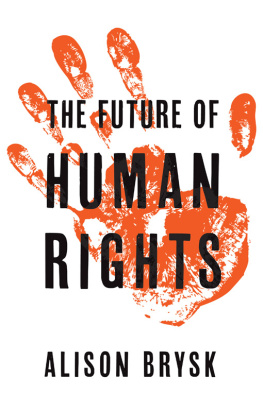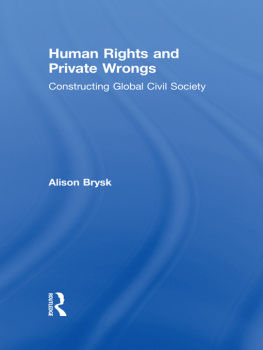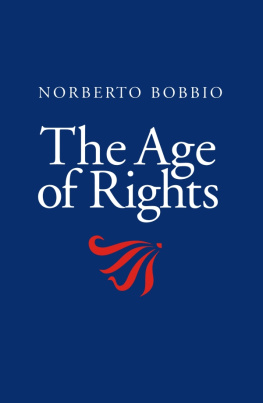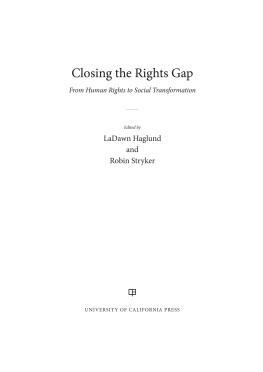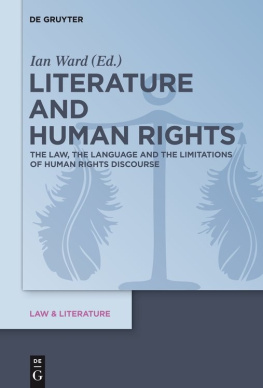Table of Contents
List of tables
List of Illustrations
Guide
Pages

Copyright Alison Brysk 2018
The right of Alison Brysk to be identified as Author of this Work has been asserted in accordance with the UK Copyright, Designs and Patents Act 1988.
First published in 2018 by Polity Press
Polity Press
65 Bridge Street
Cambridge CB2 1UR, UK
Polity Press
101 Station Landing
Suite 300
Medford, MA 02155, USA
All rights reserved. Except for the quotation of short passages for the purpose of criticism and review, no part of this publication may be reproduced, stored in a retrieval system or transmitted, in any form or by any means, electronic, mechanical, photocopying, recording or otherwise, without the prior permission of the publisher.
ISBN-13: 978-1-5095-2057-2
ISBN-13: 978-1-5095-2058-9 (pb)
A catalogue record for this book is available from the British Library.
Library of Congress Cataloging-in-Publication Data
Names: Brysk, Alison, 1960- author.
Title: The future of human rights / Alison Brysk.
Description: Cambridge, UK ; Medford, MA, USA : Polity Press, [2018] | Includes bibliographical references and index.
Identifiers: LCCN 2017043970 (print) | LCCN 2017058092 (ebook) | ISBN 9781509520619 (Epub) | ISBN 9781509520572 | ISBN 9781509520589 (pb)
Subjects: LCSH: Human rights. | Human rightsInternational cooperation. | Human rights and globalization.
Classification: LCC JC571 (ebook) | LCC JC571 .B7558 2018 (print) | DDC 323dc23
LC record available at https://lccn.loc.gov/2017043970
Typeset in 11 on 13 pt Sabon by Toppan Best-set Premedia Limited
Printed and bound in the United Kingdom by Clays Ltd, St Ives PLC
The publisher has used its best endeavours to ensure that the URLs for external websites referred to in this book are correct and active at the time of going to press. However, the publisher has no responsibility for the websites and can make no guarantee that a site will remain live or that the content is or will remain appropriate.
Every effort has been made to trace all copyright holders, but if any have been inadvertently overlooked the publisher will be pleased to include any necessary credits in any subsequent reprint or edition.
For further information on Polity, visit our website: politybooks.com
Acknowledgments
I am grateful for the opportunity offered by this series and my Polity editor, Louise Knight. I deeply appreciate the financial support since 2010 of my research at the University of California, Santa Barbara, by the Duncan and Suzanne Mellichamp Chair in Global Governance. UCSB doctoral candidates Natasha Bennett and Yunuen Gomez Ocampo provided skillful and timely research assistance. The thinking reflected in this book was shaped by dialogue with colleagues in a series of conferences and workshops: the North American Consultation on the United Nations Human Rights Treaty Body System, Columbia University, June 12, 2017; Global Rights and Democracy, Liu Center, University of British Columbia, May 16, 2017; the 2017 Marsha Lilien Gladstein Visiting Professor of Human Rights, University of Connecticut, March 28, 2017; the University of Minnesota Law School Human Rights Colloquium, March 3, 2017; the Roundtable on the Future of Human Rights, International Studies Association, Baltimore, February 224, 2017; the World Values Summit, Monterrey, Mexico, October 21, 2016; and the Human Rights and State Sovereignty: Roundtable, American Political Science Association, September 4, 2016. Many thanks to the sponsors, organizers, and all of the participants in these conversations, too numerous to name but greatly appreciated. My contribution here has been especially influenced by constructive exchanges with Ruben Dominguez and the Mexican human rights community in Monterrey; David Forsythe, Daniel Whelan, Leslie Vinjamuri, and Michael Goodhart at the APSA and ISA roundtables; Christopher Roberts, Stephen Meili, and the scholars at the University of Minnesota Law School; the University of Connecticut Dream Team Shareen Hertel, Richard Wilson, Zehra Arat, Kathryn Libal, Samuel Martinez, and Glenn Mitoma; at the University of British Columbia, Lisa Sundstrom, the Russia Justice Initiative, and Stephen Hopgood; and, at the School of International Public Affairs at Columbia, papers and discussion with Jack Snyder, Tonya Putnam, Beth Simmons, Ruti Teitel, Stephen Ratner, Felice Gaer, Yasmin Ergas, Sonia Cardenas, Anne-Marie Clark, the Center for Reproductive Rights, and Human Rights in China. The section on refugees in chapter 2 was published in a previous form as Contracting the Refugee Regime, in Alison Brysk and Michael Stohl, eds., Contracting Human Rights (Edward Elgar, 2018).
Now More Than Ever
I can trace three generations of human rights in my own family. I am the daughter and granddaughter of refugees. I would not have been born had my father not escaped persecution in war-torn France and settled in the US and his father had not first fled Poland after being beaten and jailed for labor organizing. I came of age in America with the rights revolution. One of my first memories is attending a civil rights march with my mother; during my studies I volunteered in a Vietnamese refugee camp in Hong Kong; and my first job was working in a women's clinic where we wore buttons reading: Health care is a right, not a privilege. My formal study of human rights began with my PhD dissertation, when I traveled to Argentina to chart the fall of a dictatorship, the rise of transitional justice, and the emergence of a new kind of movement: Mothers of the Disappeared. After returning to the US as the Berlin Wall fell, I became a mother myself and began a quarter-century of human rights research that carried me from Quito to Delhi, from Johannesburg to The Hague. A generation later, my daughters have come of age riding the next wave of rights: one plots new paths for economic empowerment in Latin America, while her sister advocates for the LGBTQ community. What comes next? The fate of the next generation will depend on the future of all of the rights to protection, freedom, and dignity that have shaped my own life, and newer rights frameworks for my children and grandchildren above all, environmental justice.
Human rights have fallen on hard times yet they are needed now more than ever. Despite historic advances in human rights law and mobilization, unprecedented numbers suffer war crimes, forced displacement, ethnic persecution, gender violence, and backlash against rights defenders. These hard times in practice are matched by harsh criticism in theory. Nationalists and realists claim human rights are too much, development critics and legal skeptics say human rights are not enough, while post-modern, post-colonial, and critical-school feminists argue that rights are the wrong kind of politics for liberation. Human rights are poised on the knife's edge between hope and despair, beloved and beleaguered, inspiring and ignored.
), it is time for a reboot that closes historic gaps and confronts emerging challenges. After several generations of measured success and unexpected shortfalls, the future of human rights lies in fostering the dynamic strength of human rights as political practice. People all over the world from Amazonian villages to Iranian prisons use human rights to gain recognition, campaign for justice, and save lives. With all of its limitations, human rights have proved a sustainable basis for solidarity in the face of violence and oppression. In this book, I will argue that the future of human rights must expand this practice to meet persisting threats to human dignity and craft new ways to speak rights to power. But, first, let us begin by setting the stage and defining the debate.

